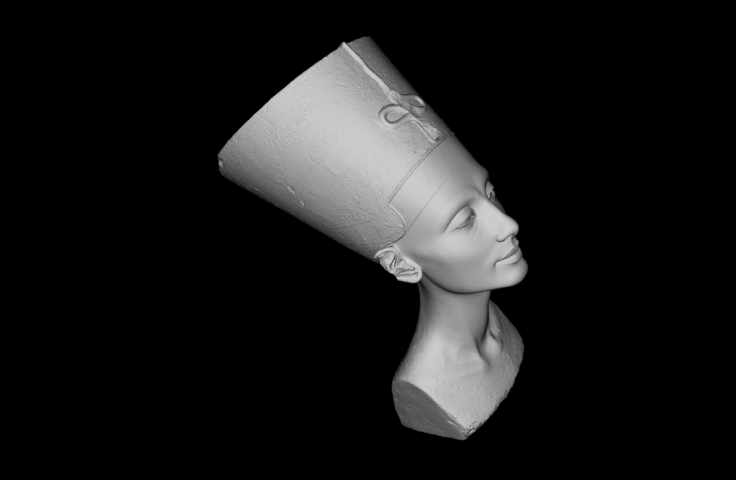Nefertiti 3D scan heist appears to be a hoax say experts

In February, news of two German artists who sneaked in a Kinect Sensor to do a 3D scan of the bust of Queen Nefertiti in Berlin's Neues Museum captivated the world with their modern art heist. German-Iraqi Nora al-Badri and her German colleague Jan Nikolai Nelles then released their data to the world, allowing anyone to download the information and create their own copies, study it or use the data to create their own spin on the original.
Several experts, however, have raised questions about the legitimacy of the artists' project, The Other Nefertiti, calling it a hoax.
The duo said they used a modified version of the Kinect, a motion sensor developed by Microsoft for the Xbox 360, which al-Badri hid under a blue cashmere scarf, to circle and scan the artefact over the course of six hours — two sessions a day. They handed the 3D data over to outside experts — hackers whose identities she did not want to reveal — to process before they leaked the data to the public under a creative commons license at the Chaos Communication Congress in Hamburg — Europe's largest hacker conference.
Artist and 3D scanning expert Fred Kahl told The New York Times that "the scan shows far more definition than is ever remotely possible."
"You look at the texture of the surface of the model they released and it has very fine, level detail of the cracks around the base and the texture on the headdress," Kahl said. He added that the scan contained more than two million mesh units known as polygons. He, however, has "never captured a Kinect scan with more than 600,000."
museumshack from jnn on Vimeo.
Researcher Paul Dochetry writes that the Kinect needs to be connected to a laptop or a large external battery pack to work as a mobile scanner and take a decent scan over a few hours — making it too heavy and bulky to conceal without a backpack. Al-Badri, who was not seen carrying a backpack, told Hyperallergic: "Of course it's possible to have a power supply in the jacket. Of course. A small laptop or a small battery. That's it."
There is also Nefertiti's headdress, which should have been difficult to capture covertly for an accurate scan. There is also the issue of scanning through glass, which should have resulted in ghosting and lighting problems.
Comparing stills from the museum's scan with that of the Germans', artist Cosmo Wenman said the duo were likely given a version of the Neues Museum's own 3D scans through a museum worker or a third party who did the scans for the museum.
Al-Badri said she could not "verify" the source of their scan because the "hackers" processed the data and created the file for them.
"Maybe it was a server hack, a copy scan, an inside job, the cleaner, a hoax. It can be all of this, it can be everything," Al-Badri said. "We are not revealing details. We are standing by the fact that we actually scanned it, but we don't want to dismiss the other options at the same time." Nelles said they didn't talk about the quality of the scan and were told "not to ask questions."
The well-preserved depiction of the royal wife of Egyptian Pharaouh Akhenaten was discovered by German archaeologists in Amarna, Egypt, in 1912. Since then, the object has been a sore topic in the art world, raising questions about the national ownership of antiquities, cultural theft and repatriation.
The covert museum scan has also highlighted the rising popularity and accessibility of 3D printing technology. The artists hoped the secret scan would put pressure on the Neues Museum and others to return disputed artifacts to their countries of origin, replace them with 3D replicas and open their archives to the public.
Although it is still unclear if the museum will be able to definitively decipher the source of the scans or seek legal action, for now, the scans are out in the open.
© Copyright IBTimes 2025. All rights reserved.





















